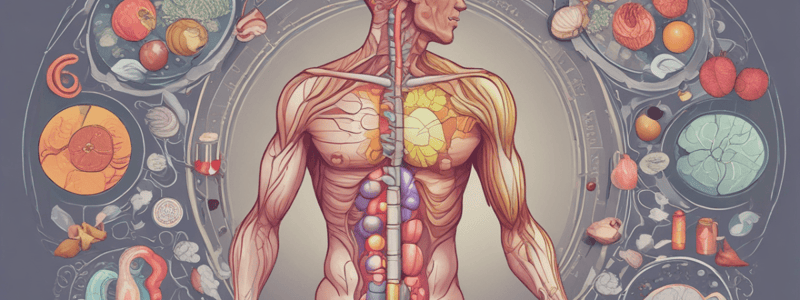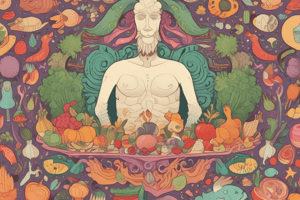Podcast
Questions and Answers
What is the primary reason why children require the greatest amount of energy per unit body mass?
What is the primary reason why children require the greatest amount of energy per unit body mass?
- Because they need more protein to build and repair muscles
- Because they have a larger body size
- Because they have a higher rate of heat loss
- Because they need to maintain a higher metabolic rate to support growth (correct)
Why do men require more energy than women?
Why do men require more energy than women?
- Because they need more iron for the formation of haemoglobin
- Because they have a larger body size and are more muscular (correct)
- Because they have a higher rate of growth
- Because they have a higher rate of heat gain
What nutrient is essential for building and repairing muscles?
What nutrient is essential for building and repairing muscles?
- Protein (correct)
- Iron
- Calcium
- Vitamin D
Why do pregnant women require more energy and protein?
Why do pregnant women require more energy and protein?
Which of the following statements is true about the iron requirement of non-pregnant women?
Which of the following statements is true about the iron requirement of non-pregnant women?
What is the primary reason why children and teenagers need larger amounts of calcium?
What is the primary reason why children and teenagers need larger amounts of calcium?
What is the primary reason why children need a higher metabolic rate?
What is the primary reason why children need a higher metabolic rate?
Why do men require more protein than women?
Why do men require more protein than women?
What is the primary function of iron in the body?
What is the primary function of iron in the body?
Why do pregnant women require more energy and protein than non-pregnant women?
Why do pregnant women require more energy and protein than non-pregnant women?
Why do women require more iron than men?
Why do women require more iron than men?
What is the primary reason why children and teenagers need larger amounts of protein?
What is the primary reason why children and teenagers need larger amounts of protein?
Which nutrient is crucial for hormone and enzyme production in the body?
Which nutrient is crucial for hormone and enzyme production in the body?
What deficiency symptom is associated with Vitamin D?
What deficiency symptom is associated with Vitamin D?
Which of the following minerals is primarily involved in muscle function and bone health?
Which of the following minerals is primarily involved in muscle function and bone health?
Deficiency of which vitamin is most likely to cause dermatitis, diarrhea, and dementia?
Deficiency of which vitamin is most likely to cause dermatitis, diarrhea, and dementia?
Which mineral deficiency can lead to symptoms such as hair loss and growth retardation?
Which mineral deficiency can lead to symptoms such as hair loss and growth retardation?
Which vitamin deficiency is associated with increased bleeding tendency and weakened bones?
Which vitamin deficiency is associated with increased bleeding tendency and weakened bones?
What are common symptoms of magnesium deficiency?
What are common symptoms of magnesium deficiency?
Which nutrient provides the most concentrated source of energy?
Which nutrient provides the most concentrated source of energy?
Flashcards
Carbohydrate function
Carbohydrate function
Provides energy for brain and physical activity.
Protein function
Protein function
Builds and repairs tissues, creates hormones and enzymes.
Fat function
Fat function
Concentrated energy source, absorbs fat-soluble vitamins.
Vitamin function
Vitamin function
Signup and view all the flashcards
Minerals function
Minerals function
Signup and view all the flashcards
Water function
Water function
Signup and view all the flashcards
Vitamin A deficiency
Vitamin A deficiency
Signup and view all the flashcards
Vitamin B1 (Thiamine) deficiency
Vitamin B1 (Thiamine) deficiency
Signup and view all the flashcards
Vitamin B3 (Niacin) deficiency
Vitamin B3 (Niacin) deficiency
Signup and view all the flashcards
Vitamin C deficiency
Vitamin C deficiency
Signup and view all the flashcards
Vitamin D deficiency
Vitamin D deficiency
Signup and view all the flashcards
Vitamin E deficiency
Vitamin E deficiency
Signup and view all the flashcards
Vitamin K deficiency
Vitamin K deficiency
Signup and view all the flashcards
Calcium deficiency
Calcium deficiency
Signup and view all the flashcards
Iron deficiency
Iron deficiency
Signup and view all the flashcards
Zinc deficiency
Zinc deficiency
Signup and view all the flashcards
Magnesium deficiency
Magnesium deficiency
Signup and view all the flashcards
Iodine deficiency
Iodine deficiency
Signup and view all the flashcards
Potassium deficiency
Potassium deficiency
Signup and view all the flashcards
Sodium deficiency (hyponatremia)
Sodium deficiency (hyponatremia)
Signup and view all the flashcards
Study Notes
Nutritional Functions
- Carbohydrates provide energy (4 kcal/g) and support brain function and physical activity.
- Proteins are crucial for growth, tissue repair, and maintenance. They offer amino acids for hormone and enzyme production (4 kcal/g).
- Fats serve as a concentrated energy source (9 kcal/g), aiding in fat-soluble vitamin absorption (A, D, E, K) while contributing to cell structure and hormone synthesis.
- Vitamins regulate various bodily processes, including metabolism and immune function. They ensure healthy skin, vision, and neurological function.
- Minerals support bone health, fluid balance, and muscle function. They participate in enzyme reactions and neurotransmission.
- Water is vital for hydration, regulating temperature, and facilitating biochemical reactions.
Vitamin Deficiencies
- Vitamin A deficiency leads to night blindness, dry skin, and immune dysfunction.
- Thiamine (Vitamin B1) deficiency can cause beriberi and Wernicke-Korsakoff syndrome.
- Niacin (Vitamin B3) deficiency manifests as pellagra, characterized by dermatitis, diarrhea, and dementia.
- Scurvy, caused by Vitamin C deficiency, is marked by bleeding gums, fatigue, and joint pain.
- Vitamin D deficiency results in rickets in children and osteomalacia in adults.
- Vitamin E deficiency can lead to neuromuscular problems and weakened immune function.
- Vitamin K deficiency increases bleeding tendency and weakens bones.
Mineral Deficiencies
- Calcium deficiency contributes to osteoporosis, rickets, and muscle spasms.
- Iron deficiency causes anemia, fatigue, weakness, and impaired immunity.
- Zinc deficiency can result in growth retardation, hair loss, and delayed wound healing.
- Magnesium deficiency leads to muscle cramps, mental disorders, and irregular heartbeat.
- Iodine deficiency manifests as goiter, hypothyroidism, and cognitive impairments.
- Potassium deficiency causes muscle weakness, cramps, and irregular heart rhythms.
- Sodium deficiency, known as hyponatremia, can cause headache, confusion, and seizures.
Studying That Suits You
Use AI to generate personalized quizzes and flashcards to suit your learning preferences.




